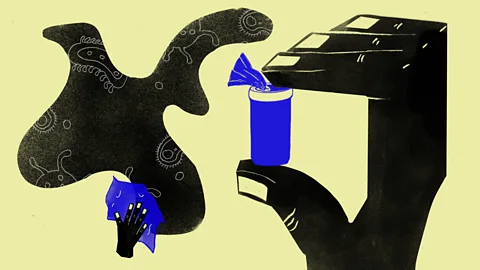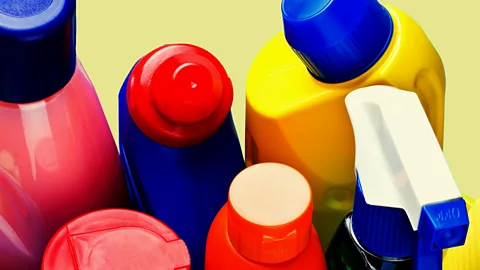Is it healthier to use household cleaning products – or not?
 Serenity Strull/ BBC
Serenity Strull/ BBCOur use of cleaning products has increased significantly since Covid-19. But some of the products we're using to clean our homes come with their own health risks.
Humans have been cleaning with chemical agents for around 5,000 years. Ancient Romans' version of the professional cleaner was the "urine scrubber", after it was discovered that urine could be used to clean fabrics. Thankfully, we've come a long way since then.
More recently, the Covid-19 pandemic has changed our everyday hygiene habits, with many people becoming more conscious of potential pathogens in the home.
Our use of cleaning products increased substantially during the pandemic, according to a Finnish study. Scientists found that, during this period, people cleaned 70% more often, and the amount of cleaning products they used increased by 75%.
Household cleaning products, including antibacterial spays, promise to kill most of the harmful bacteria in our toilets, on our kitchen surfaces and elsewhere around our homes.
But there's a growing body of scientific evidence showing that they can also increase our exposure to various harmful chemical air contaminants and particulate matter.
What are the risks involved with cleaning our homes regularly – and should we be worried about the products we're using?
Using household cleaning products is one of the "modifiable risk factors" of asthma, says Emilie Pacheco Da Silva, postdoctoral researcher at Inserm, the French National Institute of Health and Medical Research, where she specialises in the asthma effects of disinfectants and cleaning products.
This means it's a behaviour that can be changed to lower the risk of developing the condition and experiencing symptoms.
 Serenity Strull/ BBC
Serenity Strull/ BBCScientists, who in 2024 analysed 77 studies looking into the health effects of household cleaning products, concluded that they can have a harmful effect on respiratory health. In particular, cleaning products applied in spray form are suggested to have more harmful effects on the respiratory system than liquids and wipes.
The scientists found that regular use of cleaning sprays increases the risk of developing asthma, triggering current asthma, and poorly controlled asthma in adults, and wheezing in children.
Specifically, using sprays between four and seven times a week has been associated with an increased risk of asthma in young adults, and there is some evidence that symptoms worsen with increased use. Researchers say sprays are worse than other types of cleaning products because the chemicals become airborne and therefore it is easier for us to inhale larger amounts.
Some studies the researchers looked at also found a link between exposure to cleaning products during pregnancy and persistent wheezing in early childhood. These products can pose an even greater risk to children, they add, who breathe faster than adults.
One reason for this is because using cleaning products produces volatile organic compounds (VOCs), which can cause ear, nose and throat irritation.
"There's enough evidence to know that cleaning products are harmful to some people, particularly if they use them a lot. What's harder is which specific chemicals cause damage," says Nicola Carslaw, professor of indoor air chemistry at the University of York in the UK.
However, there's some evidence suggesting that there's more risk associated with certain chemicals, including chlorine, ammonia, hydrochloric acid, chloramine and sodium hydroxide, as these are corrosive and reactive irritants that, when inhaled, may damage tissues at a cellular level.
What about natural and 'green' cleaning products?
In recent years, there has been a rise in demand for 'natural' household cleaning products, which don't include any synthetic chemicals, and those that purport to be better for the environment.
Researchers concluded in their 2024 review that "green products", which contain only biodegradable ingredients, seem to be less harmful than conventional ones, though they say further research is needed to examine their impact on respiratory health.
When Pacheco Da Silva realised there were no population studies looking at the impact of "green" and homemade products on respiratory health, she analysed data from more than 40,000 people, and asked them about their respiratory health and use of household cleaning products over the previous 12 months.
She expected the data to show that using household wipes containing disinfectant on a weekly basis would have a harmful effect on asthma, and the use of green and homemade sprays and wipes would be less harmful. She initially saw that weekly use of products in all three categories were associated with asthma.
However, when Pacheco Da Silva studied the weekly use of individual product categories while also taking into account people's weekly use of irritants or sprays, the association with asthma disappeared for products branded as "green" and homemade products, whereas the use of wipes remained significantly linked with asthma.
The study indicates that "the household use of green and homemade products could be less harmful to asthma, but that the use of wipes could be deleterious," says Pacheco Da Silva.
However, she says, there's no standard definition for "green" cleaning products, which may skew the study's findings. Indeed, it is a term commonly misused in marketing slogans (read Isabelle Gerretsen's story on why terms like "green" don't always mean what you think). Carslaw adds that "green" cleaning sprays aren't necessarily any better for us, though, because our bodies don't know the difference between natural and manmade ingredients.
In one study, Carslaw looked at the chemical reactions that happen when using cleaning products containing natural ingredients. She found that they often contain as many aroma chemicals as regular cleaning products.
"With a lemon-scented cleaning product, for example, it doesn't matter if the scent is lemon or factory-made, it's the same compound when it's released into the air," she says.
This compound in lemon is limonene, and when it undergoes chemical reactions, it can produce formaldehyde, a known carcinogen.
Some people choose to use homemade cleaning products on the assumption that they're healthier. But while there's some general ideas around what these ingredients can be – water, citric acid, salt, baking soda – there's no official recipe, and there's a lack of information around how active ingredients should safely be used, scientists say.
There are also concerns among scientists that extensive use of antibacterial cleaning products is contributing to antibiotic resistance, the process whereby bacteria develop defences against antibiotics, which lessens their effectiveness against some infections.
Some studies show that using certain antibacterial products can cause a cross reaction with certain antibiotics, which means you might get a resistance to those antibiotics, which hinders their effectiveness, says Elaine Larson, professor of epidemiology at the Columbia University Mailman School of Public Health in the US.
"Eventually we may theoretically reduce the ability of the immune function to respond to an encounter with organisms," Larson says.
This can be explained by the hygiene hypothesis, Larson adds, which argues that the more bacteria, viruses and other microbes children are exposed to at an early age, the better their immune system develops. However, in recent years, there has been some disagreement from scientists about the accuracy of this theory.
 Getty Images
Getty ImagesLarson has spent her career dedicated to studying antibacterial resistance, and, in 2007, she carried out a study to address her growing concerns regarding humans' exposure to antimicrobial soaps and household cleaning products.
Larson wanted to see if there was any health benefit when it came to using products labelled as antibacterial. She gave 238 families living in Manhattan products like a kitchen spray and hard-surface cleaner (either antibacterial, or that didn't contain antibacterial ingredients) at random – all commercially available, but with the labels removed. Larson then monitored the participants every week for almost a year and took note of any respiratory viral symptoms they reported (flus, colds, coughs and runny noses).
At the end of the study, Larson found no difference in respiratory symptoms between the two groups of participants. Ultimately, it didn't seem to matter whether their laundry, bathing and hard-surface cleaners contained antibacterial ingredients or not.
"This was pretty good evidence that the most important thing is the friction [between the surface and cloth, caused by the action of cleaning], and it doesn't matter so much whether a product [contains something] labelled anti-bacterial," she says. Other studies have found that showering and bathing with nonantibacterial soap increases how much skin bacteria is dispersed into the air around us – and Larson is suggesting a similar mechanism may happen when we clean our homes.
And the US Food and Drug Administration advises that it's the motion of handwashing that's most effective, and that there is no conclusive body of research showing that antibacterial soap is any more effective than soap and water.
However, Larson concludes in the study that the types of infections most likely to be influenced by household cleaning, such as gastrointestinal disease, may be bacterial in origin – and the products selected in the study didn't claim to have anti-viral properties.
The reason for this, Larson says, is that antibacterial products don't always deter viruses, which can be airborne and are often the cause of respiratory infections. "Things on the outside of our bodies are much less likely to cause contamination than breathing in the flu, so antibacterial products aren't affecting the transmission dynamic," she says.
However, Larson adds, antibacterial products may help with gastrointestinal or bacterial infections, like salmonella, by killing or inhibiting the growth of harmful bacteria. She writes in her paper, though, that any potential benefit of using antibacterial cleaning products must be weighed against a theoretical risk for antibiotic resistance. A University of Sheffield study found that "gentle" cleansers – those without antibacterial ingredients – can kill "enveloped" viruses (viruses with an outer layer) including coronavirus.
So how should we clean our homes?
Scientists don't know the exact mechanisms behind the links between household cleaning products and our health, but the general advice is to minimise our exposure to them, Carslaw says, and only use them as often as we need to.
The American Lung Association, for example, advises keeping the area well ventilated, and to avoid using irritant ingredients.
"No one would suggest you stop cleaning, because it's had a massive impact on reducing the amount of diseases we used to get 50 years ago," Carslaw says.
However, we should always ensure there's good ventilation in the room we're cleaning, such as an open window, Carslaw adds.
Another way to lower the risk to our health, she says, is to use liquid cleaners rather than sprays.
"Sprays are effective at converting chemicals in a product into aerosols, which are easier to breathe," she says. "With liquid products, you don't get the same dose."
Carslaw also advises cutting down on cleaners that have lots of added fragrances, as this generally increases the likelihood of them containing products that will irritate our airways.
The consensus is that it's definitely safer to clean our homes than it is to not clean them at all. And with the research indicating that "green" or "natural" products may also pose certain risks, perhaps we should bear in mind that our own "elbow grease" is at least as effective as the cleaning products we choose – since the friction caused when we wipe surfaces helps to lift the bacteria off.
--
If you liked this story, sign up for The Essential List newsletter – a handpicked selection of features, videos and can't-miss news, delivered to your inbox twice a week.
